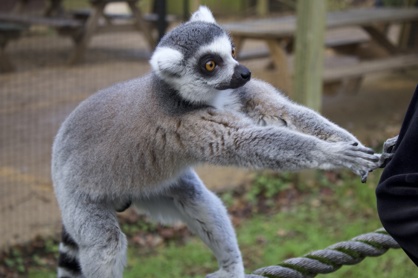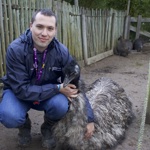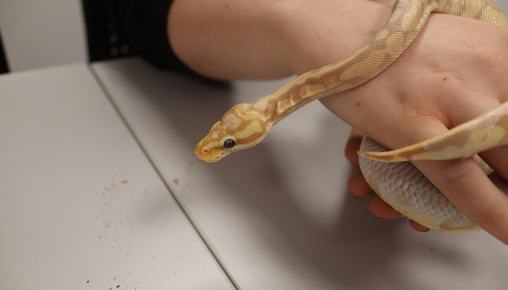 Home
Home
Your courses
Click Apply nowabove and continue to stage 2 where you can review and choose your 1st choice course to apply for.

CertHE Animal Management
Start Date: 1st September 2025
Other start dates:
2nd September 2024

- Length 2 Years
- Study Full-Time
- Location Kidderminster College
More about the course
This CertHE Animal Management will provide you with specialist work-related knowledge, understanding, and practical skills required in the animal management sector. You will study specialist units, taught by expert tutors who have worked in the industry.
From animal health, and welfare and husbandry to animal nutrition and animal behaviour and horse husbandry... you will learn to things you need to progress onto higher education and develop the skills you need to work in animal biology, zoology or animal behavior and welfare.
You will also study units such as Personal Development, Academic Study Skills, and Work-Related Learning which will help you to develop transferable skills to aid with progression in education and employment.
Entry requirements:
Level 4:
GCSE grades A* to C (4 or above) in English Language (or equivalent), and a Grade 2 or above in maths, with the requirements of sitting Functional Skills Level 2 in Maths alongside the qualification.
64 UCAS points for external applicants or a Level 3 qualification in Animal Care/Management or similar
A successful interview with the course lead, and reference provided by a responsible person
Applications will be considered from mature students who demonstrate evidence of experience within the animal industry.
Level 5:
Completion of 120 credits from the Level 4 CertHE qualification, or evidence of a Level 4 HNC qualification in Animal Management, or similar.
What will I achieve?
Upon successful completion of the Level 4, you will receive a Level 4 Certificate of Higher Education in Animal Management.
Upon the successful completion of the Level 5, you will receive a Level 5 Foundation Degree in Animal Management.
What will I learn?
Broad range of modules relating to the animal management industry to support with progression on the course, and with employment opportunities.
How is the course taught?
Level 4 will feature:
Full Time – Two days per week attendance required at college.
In class delivery involving lectures, practicals, group discussion and independent research.
Tutorial and 1-2-1 support by course lead and experience and approachable staff.
Access to a Microsoft Teams page with all relevant resources to support in learning experience.
Access to books and online journals. Resources can be ordered in to college.
The experience of the off-site practical, working with a variety of different animals from a selection of practical placements to enhance experience.
Level 5 will feature:
Full Time – One and a half days per week attendance required at college.
A full day of practical volunteering at an animal management provision partnered with the college.
In class delivery involving lectures, group discussion and independent research.
Tutorial and 1-2-1 support by course lead and experience and approachable staff.
Access to a Microsoft Teams page with all relevant resources to support in learning experience.
Access to books and online journals. Resources can be ordered into college.
How am I assessed?
On Level 4, you will be assessed through many different methods such as written and illustrated reports; the completion of portfolios; practical assessments at the animal centre and horse yard; and presentations to demonstrate knowledge and assessment criteria.
Group discussions, debates and group tasks will allow for formative assessment which is where the tutors will assess the knowledge developed and gained throughout the module.
On Level 5, you will be assessed through illustrated reports, designing of resources and utilising in a microteach, practical assessments in your workplace, debates and completion of portfolios.
Work experience opportunities:
On Level 4, practical placement will take place weekly across the year in a variety of different work placements where you will get the opportunity to work alongside domesticated animals such as rabbits, guinea pigs, and hamsters; exotic mammals such as meerkats, alpacas, ring-tailed lemurs, and wallabies; farmed animals such as cattle, goats, pigs, and sheep; equines such as horses and ponies; and bird species such as emu, lorikeets, chickens, and macaws. Transport to each practical placement can be via the college minibus unless students with a drivers licence wish to make their own way there.
On Level 5, students will complete a full day of volunteering to be timetabled alongside college lecture days. The animals you could work with could include exotic, domesticated and farmed animals. The practical provision you will be placed at will be decided before the commencement of the course.
Where can I progress?
Following the completion of the Level 4 Certificate in Higher Education, you can progress to the Level 5 to gain a Foundation Degree.
Following Level 5, you can progress to a top-up degree qualification at university, or you can progress in to employment.
Course costs:
Tuition fees vary depending on the course and mode of study. Read more about tuition fees and financial support.
It's important that you know what your tuition fee includes and what other costs you'll need to plan for. Read what your fee includes.
Get in Touch
Meet our tutors and students

Tom Grosvenor
Tutor - Work-Based Animal CareFrom my experience in the industry working with Cheetahs, Lorikeets, Tigers, Reindeer and Llamas to Chinchillas, it is essential students get the opportunity to gain invaluable experience working hands-on with animals and gaining knowledge in the classroom. The courses I run are a great mix of exciting and informative theory sessions and work-related practical experience working with various animals, including Emus, Wallabies, Alpacas, Pigs, Lemurs, Horses, Macaws, Cows and many more!
Animal Care
Gallery

What can I do with a qualification in Animal Management?
Daily tasks:
- Maintains records, raises and forwards reports and certificates in compliance with current legislation.
- Carries out expert witness work and undertakes teaching of veterinary students.
- Performs ante-mortem inspection of animals destined for the food chain, and animal post-mortem examinations.
- Performs tasks relating to food safety policy, regulation of veterinary drugs, quality control of veterinary products.
- Euthanases old, sick, terminally ill and unwanted animals.
- Investigates outbreaks of animal diseases and advises owners on feeding, breeding and general care.
- Administers local or general anaesthetics and performs surgery.
- Inoculates animals against communicable diseases.
- Examines animals, diagnoses condition and prescribes and administers appropriate drugs, dressings, etc., and arranges or undertakes any necessary x-ray or other tests.
Powered by EMSI
Daily tasks:
- Advises clients on preventative medicine to maintain appropriate animal health and welfare.
- Maintains the biosecurity of the veterinary premises.
- Cares for animals in hospital accommodation and keeps accurate records.
- Collects and analyses blood, urine and other samples.
- Handles animals during treatment.
- Dispenses and administers medication and applies dressings to animals under direction from the veterinarian.
- Prepares operating theatre, sterilises equipment and assists in theatre as required.
- Assists the veterinary surgeon during surgical and medical treatments of animals.
Powered by EMSI
Daily tasks:
- Patrols public areas to search for and capture stray or nuisance dogs, and transports captured animals to kennels.
- Meets prospective owners and advises on animal selection and animal care.
- Checks animals for illness, treats minor ailments or calls for vet if further treatment is required.
- Houses, feeds, exercises, trains, grooms horses, dogs and other animals in preparation for entry to shows, races and other events.
- Cleans animals.
- Feeds, washes, grooms, trims and exercises animals.
Powered by EMSI
Daily tasks:
- Carries out maintenance on farm buildings, hedges, ditches and erects and repairs fences.
- Moves and handles livestock and tends them during birth and rearing of young.
- Treats minor ailments and assists veterinary surgeon as required.
- Cleans barns, sheds, pens, yards, incubators and breeding units and sterilises milking and other equipment as necessary.
- Weighs and measures foodstuffs, feeds animals and checks them for any signs of disease.
- Cultivates growing crops by hoeing, spraying and thinning as necessary.
- Operates farm machinery to prepare soil, fertilise and treat crops.
Powered by EMSI
What can I do with a qualification in Animal Management?
Veterinarians
Daily tasks:
- Maintains records, raises and forwards reports and certificates in compliance with current legislation.
- Carries out expert witness work and undertakes teaching of veterinary students.
- Performs ante-mortem inspection of animals destined for the food chain, and animal post-mortem examinations.
- Performs tasks relating to food safety policy, regulation of veterinary drugs, quality control of veterinary products.
- Euthanases old, sick, terminally ill and unwanted animals.
- Investigates outbreaks of animal diseases and advises owners on feeding, breeding and general care.
- Administers local or general anaesthetics and performs surgery.
- Inoculates animals against communicable diseases.
- Examines animals, diagnoses condition and prescribes and administers appropriate drugs, dressings, etc., and arranges or undertakes any necessary x-ray or other tests.
Powered by EMSI
Veterinary Nurses
Daily tasks:
- Advises clients on preventative medicine to maintain appropriate animal health and welfare.
- Maintains the biosecurity of the veterinary premises.
- Cares for animals in hospital accommodation and keeps accurate records.
- Collects and analyses blood, urine and other samples.
- Handles animals during treatment.
- Dispenses and administers medication and applies dressings to animals under direction from the veterinarian.
- Prepares operating theatre, sterilises equipment and assists in theatre as required.
- Assists the veterinary surgeon during surgical and medical treatments of animals.
Powered by EMSI
Animal Care Services Occupations
Daily tasks:
- Patrols public areas to search for and capture stray or nuisance dogs, and transports captured animals to kennels.
- Meets prospective owners and advises on animal selection and animal care.
- Checks animals for illness, treats minor ailments or calls for vet if further treatment is required.
- Houses, feeds, exercises, trains, grooms horses, dogs and other animals in preparation for entry to shows, races and other events.
- Cleans animals.
- Feeds, washes, grooms, trims and exercises animals.
Powered by EMSI
Farm Workers
Daily tasks:
- Carries out maintenance on farm buildings, hedges, ditches and erects and repairs fences.
- Moves and handles livestock and tends them during birth and rearing of young.
- Treats minor ailments and assists veterinary surgeon as required.
- Cleans barns, sheds, pens, yards, incubators and breeding units and sterilises milking and other equipment as necessary.
- Weighs and measures foodstuffs, feeds animals and checks them for any signs of disease.
- Cultivates growing crops by hoeing, spraying and thinning as necessary.
- Operates farm machinery to prepare soil, fertilise and treat crops.
Powered by EMSI
Good to know
What's happening?
Events
Course Added
This course has now been added to your basket. Please click below to apply now or contine browsing.
Apply Now Higher Education Funding
Higher Education Funding
 Student Support
Student Support
 Travel and Transport
Travel and Transport
 Entry Requirements for Higher Education
Entry Requirements for Higher Education


